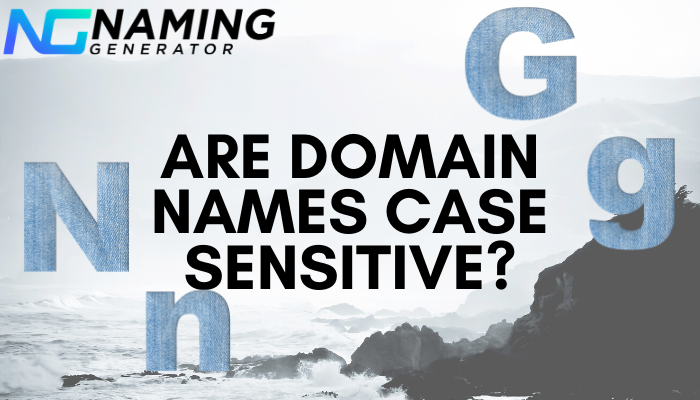Are Domain Names Case-Sensitive?
A domain name is, simply put, a website’s name. Strictly, it is the address where all users of the Internet can find a particular website. Computers use IP addresses, or a number series, in assigning a location to each website. However, it is not easy for humans to remember strings of numbers, not to mention several different IP addresses. So another way to put it is: a domain name is the human-readable (and memorable) website location. If your job entails searching multiple websites every day or if you are thinking of building your own website, surely you, at some point, have wondered if domain names are case-sensitive or not.
Are domain names case-sensitive? The American Standard Code for Information Interchange (ASCII)-based domain names are NOT case-sensitive. ASCII codes represent text in computers, telecommunications equipment, and other devices. This is true for a majority of the domains in the world, regardless of domain name extension (.com, .gov, .edu, .net, .org, etc.). What might appear to be exceptions are the Internationalized Domain Names (IDN) which contain at least one language-specific script or alphabets, such as Arabic, Chinese, Cyrillic, Devanagari, Hebrew, or the Latin alphabet-based characters with diacritics or ligatures, such as French.
Traditionally, the domain names within the Domain Name System (DNS) have all been ASCII-based. The American Standard Code for Information Interchange (ASCII) is, simply, a character-encoding standard for electronic communications. All ASCII-based domain names are not case sensitive and will continue to be so. In other words, the domain names like Amazon.com, CNN.com, etc. are not case-sensitive at all. It does not matter whether you type amazon.com, Amazon.com, AmaZon.com, or even cnn.com — you will still be taken to your intended website.
So if you have your own website and are worried that letter case might cause your potential customers to get lost, don’t fret: they’ll most likely get there just fine. As we will discuss further later on, some websites are just represented in a combination of upper and lower cases as a matter of style (it makes it easier to read/distinguish words). Both YourBusiness.com and yourbusiness.com will take your customer to your web page. But if you have an address beyond the .com (or .net or any other TLD) part, that’s when letter case will matter.
Why are Domain Names Meant to be Case-Insensitive?
Case-insensitive domain names bear a more practical advantage. It makes it easier for potential customers or website visitors to avoid confusion or bad recall and still be able to land on the correct website. If you are about to register a domain name for your business or organization, it might be ideal to register your domain name as case-insensitive, as well.
If in the registration process you notice that the domain name given in all upper-case letters, no need to panic, that’s completely okay. The actual registration is done in all lower-case letters.
However, when you share your domain name with others, it’s alright to use upper-case letters to make it easier to read, as mentioned earlier. More on this later.
Why do Some International Domain Names Seem to be Case-Sensitive?
In modern DNS, we now have something referred to as Internationalized Domain Names (IDN). These domain names can contain language-specific characters. As such, it might be tricky to define upper-case and lower-case characters in certain languages, which is why IDNs may seem to be case-sensitive.
Can a URL be Case-Sensitive?
URL (Uniform Resource Locator) and domain name are some of the common terms in internet language and these two are often interchanged. Bear in mind, though, that these two terms are absolutely dissimilar.
A URL is a string of alphanumeric and special characters that provides the information on the location or “complete internet address” of a webpage. A domain name is a more human-friendly form of an IP address and is just an element of a URL.
Take this website for an example: NamingGenerator.com. The website’s domain name is NamingGenerator.com (or, yes, naminggenerator.com) while its URL is http://naminggenerator.com/and-everything-else-that-may-follow-when-you-click-on-links-on-the-site.html.
When typing a URL, letter capitalization may be necessary. A URL (or internet address) is only case-sensitive after the domain name (particularly, after the .com part).
Why is a URL after the Domain Name Case-Sensitive?
While the actual domain name is not case sensitive, the full URL to a specific webpage on the domain may be case sensitive. Let’s say, for example, you have a page called product.htm on your website. So the URL to this page will be https://yourdomain.com/product.htm. This URL is not the same as https://yourdomain.com/PRODUCT.HTM.
For the same reason that links within a website should match the letter case of the name of the file they actually link to, the address after the .com (or any TLD) needs to match the letter case of the specific file or folder’s name. In our earlier example, although the domain is valid, the product.htm file name is in upper-case in the second example, and that file may not actually exist on the server.
In other words, yourdomain.com/product will go directly to a page on the webserver that is in a folder named “product”. This won’t work with “PRODUCT” because there is no folder on the server with that name.
Operating systems (even Linux) treats a file with different letter-casing as a different file. In our example, because the “PRODUCT.HTM” file does not exist on the server, your browser will generate a “404 error” message.
Does it Matter How I Capitalize a Domain Name on Business Stationery or Content?
Domain names are not only used in internet browsers, but they also abound offline, as well. Your domain name likely (and, in fact, ideally) appears on your stationery, your business card, brochures, and other marketing content media.
In any URL, upper-casing is optional but only up to the .com part. Internet addresses become case-sensitive after the .com (same goes for .org, .edu, and other types of TLDs). When advertising your URL (or web address), it is okay to use upper-case letters in the domain name part of your website’s URL for emphasis, distinction, or easy reading.
yourdomainname.com could be printed on your letterhead as YourDomainName.com and you can still be confident that your potential customer will find your website.
Furthermore, it pays to consider the “aesthetics” of your domain name on print media. The first consideration in this aspect is the use of upper and lower case to enable identification of separate words within that name and help clarify its meaning.
It is not only rude or questionable misinterpretation or association that can cause problems when multi-worded domain names are presented offline. Confusion or misreading may happen when consecutive words in a domain name end and start with the same letter. Some might even construe it as a misprint. Upper-casing, where such words join, will help distinguish the words.
In the online universe, a company’s domain name may influence how a potential customer might perceive the organization. A poorly-considered domain name may be perceived as a representation of a poor company, and a good domain name may give the impression of a solid company that’s good to do business with.
As an internet user, if you are uncertain if the page or directory you need to visit is in upper-case or lower-case, it is always the safer bet to use lower-case. The majority of webpages on the Internet are going to be in all lower-case. As a webpage creator, always save all files with lower-case file names (including the file extension).
If you are about to register the domain name for your first-ever website but are new to all this, don’t get confused with all this jargon. The domain name that you register will, in very high likelihood, NOT be case-sensitive. Registering an Internationalized Domain Name is not yet a common practice. The really important thing is to confirm before taking the first steps to register a domain name for yourself or your business is to decide on the domain name you want. Easily get help at this free online domain name generator tool. From there, you can likewise get good recommendations for domain name registrars and web host services. Go build that site!
SOURCES
https://en.wikipedia.org/wiki/ASCII
https://en.wikipedia.org/wiki/Internationalized_domain_name
https://abhijitrawool.com/are-domain-names-case-sensitive/
https://www.quora.com/Are-website-domain-names-case-sensitive
http://www.digitalfamily.com/faq/should-i-use-lowercase-or-uppercase-letters-in-a-domain-name/
https://www.computerhope.com/issues/ch000709.htm
https://techdifferences.com/difference-between-url-and-domain-name.html
http://www.ez-domainnameregistration.com/domain_name_basics.htm







